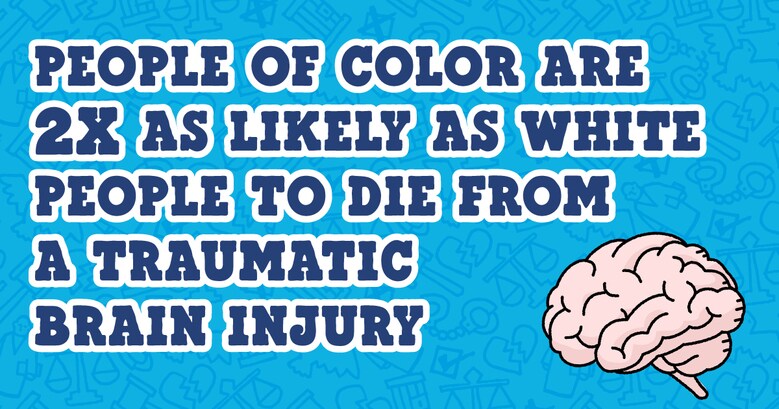What’s Your Love Language?
This Valentine’s Day, show love by standing up for your values and taking action. Join us and the ACLU in writing love letters to the communities and causes you care about!
With the Big Game coming up, we’re working with our friends at LoveYourBrain to raise awareness about racial disparities in the causes and consequences of traumatic brain injury (TBI), and what we can do about it.
But before we dig into that, let’s take a look at what a TBI actually is.

A traumatic brain injury (TBI) is a bump, blow, or jolt to the head that disrupts brain functioning. Concussions are the most common form of TBI.
Falls are responsible for about half of all TBI-related hospitalizations (they are a major factor for young children and adults over 65), but auto accidents, contact sports, and assaults are other common ways that people may get a TBI.
TBI results in chronic, complex, and often debilitating health issues for millions of people worldwide every year. Effects can include
These effects can be short lived, or they may last weeks, months, or even years. Treatment, which could include both physical and mental-health therapy, can help those who’ve had a TBI begin to heal.
TBI does not affect all people equally—there are big racial disparities in the causes, risk, medical care, and health outcomes.
Very few studies have directly investigated these startling disparities—and that needs to change.
The truth is that, whether it’s for a TBI or some other health issue, Black and Brown people are less likely than white people to have access to medical facilities and insurance due to systemic racism.
Research has also shown that doctors routinely fail to provide appropriate treatment to people of color who report experiencing pain. Not only that, but studies indicate that racial disparities are present even when it comes to treating children:
The Big Game is coming up, which makes this conversation about racial disparities and TBI even more important—70% of active, and 60% of retired, professional football players are Black.
A recent study led by a Boston University neuropathologist, found that 99% of 202 deceased former pro football players’ brains showed signs of neurodegenerative disease. Scientists believe that this disease is caused by repeated TBI.
Professional players, of course, aren’t the only ones at risk of TBI. Researchers additionally found that 48 of 53 brains of former college players also showed signs of CTE. So did seven of eight who played professional football in Canada and nine of 14 semiprofessional players.
For many years, the top pro football league in the US employed a "race norming" dementia test to determine whether Black players would qualify for payouts in a brain-injury settlement.
What does that mean? Basically, the test operated under the assumption that Black players have lower cognitive function than white players, so they had to show a sharper decline to be eligible for the money.
Former players campaigned to force the league to reverse course, but the almost unbelievable truth is that “race norming” is used throughout the US healthcare system, in everything from cardiology to oncology. Race norming relies on racial stereotypes—it embeds race-based assumptions in diagnostic tools and algorithms that often result in Black patients receiving inadequate care. And when it comes to healthcare, this kind of ingrained bias and racism is a matter of life or death.
The good news is that LoveYourBrain's research has shown that when TBI rehabilitation programs are available and integrate racial-justice strategies, the BIPOC (Black, Indigenous, people of color) community experiences improved:
TBI has a huge impact on millions of people and their families every year. Systemic racism makes TBI even more challenging for people of color.
We must include the BIPOC community in TBI research. And we need more intersectional programs and resources to fight racial injustice in TBI—and in the healthcare system overall.
Learn more about LoveYourBrain and its free programs, and be part of the work to help fight racial injustice in TBI.
Subscribe Now And We'll Make Sure You Get The Inside Scoop On Ben & Jerry's Fun And Flavors! It's Like Dessert For Your Inbox, And You're Going To Want Seconds.